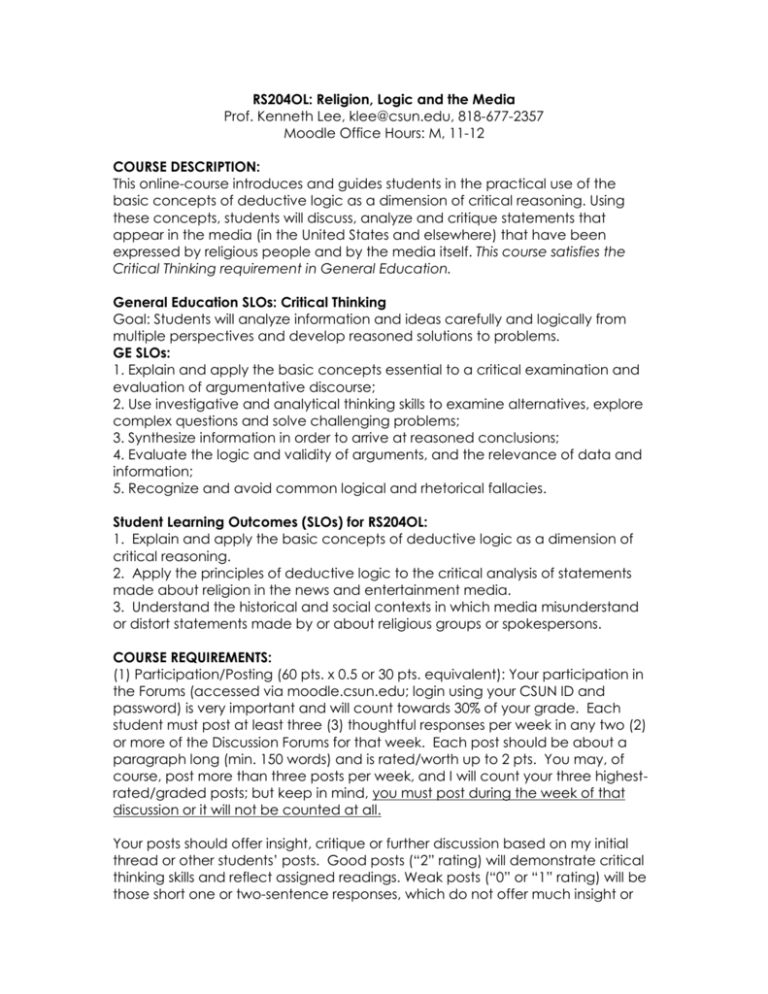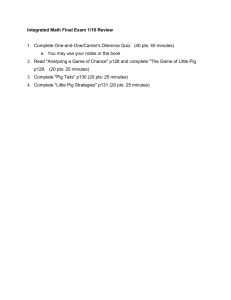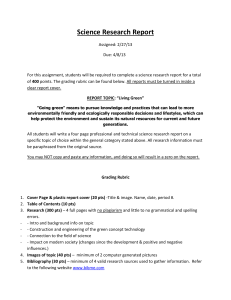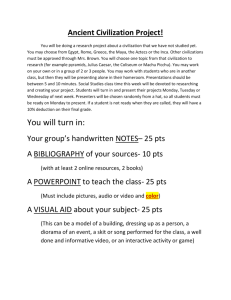RS204OL: Religion, Logic and the Media Prof. Kenneth Lee, klee
advertisement

RS204OL: Religion, Logic and the Media Prof. Kenneth Lee, klee@csun.edu, 818-677-2357 Moodle Office Hours: M, 11-12 COURSE DESCRIPTION: This online-course introduces and guides students in the practical use of the basic concepts of deductive logic as a dimension of critical reasoning. Using these concepts, students will discuss, analyze and critique statements that appear in the media (in the United States and elsewhere) that have been expressed by religious people and by the media itself. This course satisfies the Critical Thinking requirement in General Education. General Education SLOs: Critical Thinking Goal: Students will analyze information and ideas carefully and logically from multiple perspectives and develop reasoned solutions to problems. GE SLOs: 1. Explain and apply the basic concepts essential to a critical examination and evaluation of argumentative discourse; 2. Use investigative and analytical thinking skills to examine alternatives, explore complex questions and solve challenging problems; 3. Synthesize information in order to arrive at reasoned conclusions; 4. Evaluate the logic and validity of arguments, and the relevance of data and information; 5. Recognize and avoid common logical and rhetorical fallacies. Student Learning Outcomes (SLOs) for RS204OL: 1. Explain and apply the basic concepts of deductive logic as a dimension of critical reasoning. 2. Apply the principles of deductive logic to the critical analysis of statements made about religion in the news and entertainment media. 3. Understand the historical and social contexts in which media misunderstand or distort statements made by or about religious groups or spokespersons. COURSE REQUIREMENTS: (1) Participation/Posting (60 pts. x 0.5 or 30 pts. equivalent): Your participation in the Forums (accessed via moodle.csun.edu; login using your CSUN ID and password) is very important and will count towards 30% of your grade. Each student must post at least three (3) thoughtful responses per week in any two (2) or more of the Discussion Forums for that week. Each post should be about a paragraph long (min. 150 words) and is rated/worth up to 2 pts. You may, of course, post more than three posts per week, and I will count your three highestrated/graded posts; but keep in mind, you must post during the week of that discussion or it will not be counted at all. Your posts should offer insight, critique or further discussion based on my initial thread or other students’ posts. Good posts (“2” rating) will demonstrate critical thinking skills and reflect assigned readings. Weak posts (“0” or “1” rating) will be those short one or two-sentence responses, which do not offer much insight or contribute to further discussion. Also, I will ask you to post a Weekly Summary of what you learned after each week - this will also count towards your participation/posting requirement. I will monitor your participation and guide the discussions accordingly. So, for each week of participation in Discussion Forums, you can receive up to six (6) points total (3 posts X 2 pts. = 6 pts. per week) and you will be only required to post for ten (10) weeks (so, 6 pts. per week X 10 weeks = 60 pts. total). Be sure to track your points earned per week for ten weeks. The total points earned will be multiplied by 0.5 at the conclusion of the course to figure out your participation points; so, 30 pts. total possible. You will be asked to give me this number so that I can confirm it with my calculations at the end of the course. (2) Ten quizzes (30 multiple-choice and 20 T/F, one-hour timed, 5 points per quiz, 50 points total, 50%) (3) Team PowerPoint presentation* (10 pts.; 10%). By the end of Week One, students will be assigned to a team (note: students may also propose their own preference of team members), consisting of 5-6 members to choose a recent religious topic in the media and create an 8- to 10-slide Microsoft PowerPoint presentation (with speaker notes) that identifies issues/problems, fallacies, and/or logical errors, analyzes and evaluates compelling arguments, and provides a course of action with rationale for successful resolution. Students should also include a brief discussion on other people’s criticisms of their suggested solutions and how they would respond to them. Each team should appoint a leader who will take the initiative to facilitate and submit the final version of the PowerPoint via the Assignment link (one submission per team only). Also, each team can opt to leave off the name(s) of any team member(s) who did not contribute to the team project. Slides should also include References (at least three reliable sources; not Wikipedia nor Yahoo Answers, etc., in APA format – see examples in the CSUN library). The presentation will be graded on the demonstration of effective critical thinking/problem-solving skills and the quality of PowerPoint slides/notes. (4) Reflection paper* (3 full pages, min. 750 words,10 pts.; 10%), which discusses what you learned about critical thinking during the course with specific references (further guidelines are given on the “Assignments” link on moodle). Note: There is no final exam. *Plagiarism: Intentionally or knowingly representing the words, ideas, or work of another as one's own in any academic exercise. In Section 41301, Title 5, California Code of Regulations, plagiarism is “an offense for which a student may be expelled, suspended, or given a less severe disciplinary sanction...” So when in doubt, make sure to cite (use APA format). The instructor reserves the right to request an electronic version of the paper. Late submission of writing assignments will be penalized according to the discretion of the instructor (e.g., 1-5 pts. within one week; assignments will not be accepted after one week of the due date). Important*** You will be required to submit all assignments via moodle (moodle.csun.edu). Be sure to submit your assignments using Microsoft Word .doc or .docx attachments (Note: I cannot open .wps or other obscure versions; or simply type in your text). I will give you one warning if you submit your file incorrectly; if it happens again, you will be assessed a penalty point for not following directions. If in case you receive a “0” for an assignment you submitted, that means I was not able to open your file, so you must resubmit that assignment to my email, klee@csun.edu by the date set by me (note: if you do not resubmit by the due date, you will be given a “0” for the assignment). I will do my best to post grades/comments to your papers within a week after submission. Extra Credit (Optional; worth up to 4 pts.): Watch a recent movie and write a short report (2 full pages, min. 500 words), which identifies and analyzes religious issues/problems then proposes a course of action with rationale for successful resolution (note: you must scan/take a photo of and attach your entrance ticket to your report to receive full credit). This report should relate what was seen to some aspect of our class; due by the last day of class, not accepted after. Participation/Weekly posts Ten quizzes Team PPT presentation Reflection paper Total = 30 pts 50 pts 10 pts 10 pts 100 pts Grading % (out of 100 total points): 94-100 A, 90-93 A-, 87-89 B+, 84-86 B, 80-83 B-, 77-79 C+, 74-76 C, 70-73 C-, 66-69 D+, 60-65 D, <60 F. REQUIRED TEXTS: Vaughn, L. (2013). The power of critical thinking: Effective reasoning about ordinary and extraordinary claims (4th ed.). New York, NY: Oxford University Press. Website suggestions for media examples and analysis: Los Angeles Times: http://www.latimes.com/ New York Times: http://www.nytimes.com/ Washington Post: http://www.washingtonpost.com/ Newsweek: http://www.newsweek.com/ Time: http://www.time.com/time/ NPR: http://www.npr.org/ Democracy Now: http://www.democracynow.org/ Colbert Nation: http://www.colbertnation.com/home The Daily Show with Jon Stewart: http://thedailyshow.com/ The Pew Forum on Religion and Public Life: http://pewforum.org/ Blogs About Religion: http://beliefnet.com/News/2004/08/Best-SpiritualBlogs.aspx Religion News Service: http://www.religionnews.com/ PBS, Religion and Ethics Newsweekly: http://pbs.org/wnet/religionandethics/ The Independent of London: http://www.independent.co.uk/ Information online: Elements and standards of Critical Thinking Online Model: http://www.criticalthinking.org/courses/Elements_standards_model.cfm (Go to “Click to Open”) COURSE SCHEDULE: Week 1 – Introduction to critical thinking Read Ch. 1: The Power of Critical Thinking Quiz Week 2 – Impediments to critical reasoning Read Ch. 2: Obstacles to Critical Thinking Quiz Week 3 – Argument basics; judging arguments Read Ch. 3: Making Sense of Arguments Week 4 – Argument patterns; long arguments Read Ch. 3: Making Sense of Arguments Quiz Week 5 – Experts, evidence, personal experience Read Ch. 4: Reasons for Belief and Doubt Week 6 – News media, advertising Read Ch. 4: Reasons for Belief and Doubt Quiz Week 7 – Fallacies of irrelevant premises Read Ch. 5: Faulty Reasoning Week 8 – Fallacies of unacceptable premises Read Ch. 5: Faulty Reasoning Quiz Team PowerPoint due Week 9 – Deductive reasoning Read Ch. 6: Deductive Reasoning: Propositional Logic Quiz Week 10 – Enumerative induction, opinion polls Read Ch. 8: Inductive Reasoning Week 11 – Analogical and causal arguments Read Ch. 8: Inductive Reasoning Quiz Week 12 – Explanations, inferences, theory criteria Read Ch. 9: Inference to the Best Explanation Quiz Week 13 – Scientific method, testing, theories Read Ch. 10: Judging Scientific Theories Week 14 – Judging scientific theories, weird theories Read Ch. 10: Judging Scientific Theories Quiz Week 15 – Moral reasoning, moral theories Read Ch. 11: Critical Thinking in Morality and the Law Quiz; Reflection Paper due; Extra credit due







